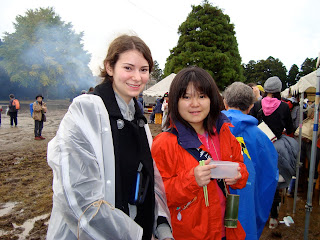Today I had such a humbling experience, courtesy of a boy named Yusuke, whom I met only earlier today, and whom I may never see again. I completed my first hour of my new part time job, English tutoring, today from 2:45 to 3:45. During the hour, six Japanese students came, and together we had a conversation in English. One girl, Noriko, asked me if I knew anything about メイドきっさ(
meido kissa), or maid cafes. I told her I had heard of them and knew the general idea behind the running of a maid cafe. Then Yusuke asked me if I considered maid cafes to be a part of Japanese culture, and I replied, "yes." Yusuke then said, "I am sorry to hear that."
I immediately felt that I had offended him. I said, "Well, I do not consider maid cafes to be part of traditional Japanese culture, but they originated in Japan, and there are not, to my knowledge, maid cafes in other parts of the world." But I felt that the damage had been done, and now I'm wondering if some boy whom I barely know has this image of me as a thoughtless foreigner who holds incorrect stereotypes about various aspects of Japanese society. I don't see myself in that way, and I would be ashamed if anyone did.
After dinner tonight, I told Okaasan and Otousan about the exchange Yusuke and I had earlier today. Okaasan and Otousan both said that if they heard me say that I consider maid cafes to be a part of Japanese culture, they would have the same reaction Yusuke did. I asked why, explaining again that I don't consider maid cafes to be traditional, but since they are unique to Japan, I would consider them to be a part of Japanese culture. After I mentioned this, an intense discussion ensued, most of which was over my head due to the fact that Otousan uses sophisticated vocabulary and speaks quickly. But with my two years of study of Japanese and my will to learn, I was able to catch some of what Otousan was saying, helped by slowly spoken elaborations from Okaasan. Otousan said that maid cafes are not culture, they are a specific lifestyle for a select group of people (including both patrons and employees). Maid cafes are too specific of a phenomenon to characterize as culture. Furthermore, maid cafes and those who work/patronize maid cafes are not highly regarded by those who do not partake of those activities, and it may be insulting for such an undesirable phenomenon to be considered culture, because culture is generic term that applies to a majority of people. For those reasons, my earlier statement was most likely offensive or disappointing to Yusuke, Okaasan, and Otousan.
One thought I took away from this whole experience is that I must rethink my definition of culture. This comes as a shock to me, for I always considered myself to be a culturally aware and culturally sensitive person. But a seemingly harmless statement can still offend anyone, and I suppose since I made such a generalization, I do not truly understand the definition of the word culture.


 Christmas seems to be widely celebrated in Japan, but not so much as a religious holiday. Instead, it seems to be a sort of commercial holiday for most people, and everyone celebrates with either their family or their significant other.
Christmas seems to be widely celebrated in Japan, but not so much as a religious holiday. Instead, it seems to be a sort of commercial holiday for most people, and everyone celebrates with either their family or their significant other.


























